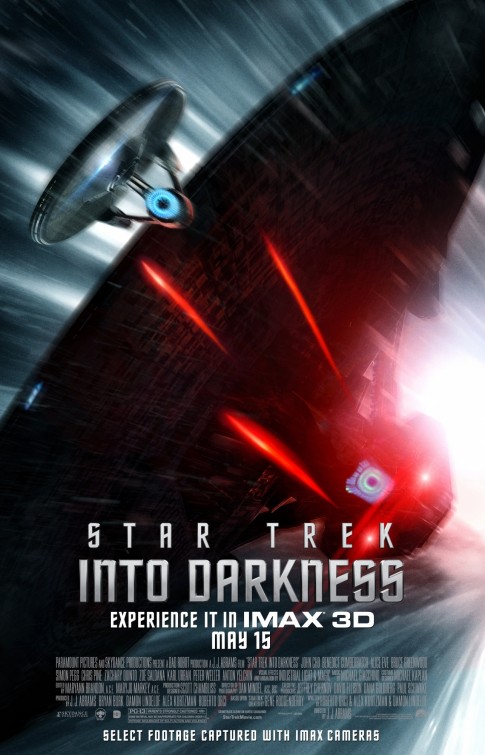Beyond The Darkness, Lies Greatness
Director
J.J. Abrams
Starring
Chris Pine
Zachary Quinto
Karl Urban
Benedict Cumberbatch
The original Star Trek show was always about exploration and the unknown, the Star Trek films, on the other hand, had trouble finding their flow but ultimately were about conflict and instability. For this reason, the films have never really been on a Star Wars scale, have never found that kind of box office audience and have provided sporadic results. And as much as Trek purists argue that Trek films should be like the show, doing this can produce things like bloody Star Trek: Insurrection – which is by far the worst Star Trek film to date. Into Darkness picks up where Star Trek left off and tries to reposition the entire franchise toward the heights of exceptional science fiction action. To achieve this, Abrams sacrifices a lot of drama, character development, substantial original material and avoiding predictability. All for the belief that these would compromise this new formula that works incredibly well for contemporary audiences.
Trying to keep this spoiler free is going to be taxing but I’ll give it a go. The story opens with a simple mission gone awry which highlights Kirk’s [Pine] disregard for crew safety and Spock’s [Quinto] inability to express his concerns and (for lack of a better word) feelings to and about the crew. The fallout of this leads to Kirk’s demotion and Spock reassigned to another starship. At the same, an underground Starfleet base in London suffers a terrorist attack at the hands of rogue operative John Harrison [Cumberbatch] and an emergency meeting of high ranking officials is convened to discuss how best to proceed. This too suffers a monstrous attack and Kirk is reinstated by Admiral Marcus [Peter Weller] to pursue Harrison deep into Klingon space. The actions Kirk undertakes in order to seek vengeance distance him from his shipmates and put everyone’s lives in jeopardy. Things become even more unclear for Kirk when he decides to follow Spock’s advice and take Harrison prisoner, rather than simply killing him as per Starfleet’s controversial orders.
The calibre of acting still strikes that perfect chord of homage and unique reimagining and the chemistry between the cast is just as solid and engrossing. The inclusion of Alice Eve, Benedict Cumberbatch and Peter Weller are welcome additions and serve a genuine purpose, rather than mere disposable cameos. The visuals (in terms of CGI effects and production design) are beyond spectacular, really nailing the scope and scale of space travel. One of the elements that irritated many fans but I found a nice touch was the visual design of the Enterprise’s engineering sections. Giving the ship a look and feel of actual human construction, rather than sleek, plasticy, glowing cylinders – adding to the weight of realism. The epic (and now familiar) score returns to remind us that reinventing a popular theme is so risky but when done well, goes a long way to establishing new territory. Jerry Goldsmith performed the same mastery 34 years ago and Michael Giacchino has really made a mark on how Star Trek sounds [insert Uhura joke here]. I’d honestly love to see what he could do with a Star Wars theme. Yes, there is still an obscene amount of forced lens flares bouncing off every single fucking surface but I’ve now surrendered myself to this and it’s actually becoming a synonymous Trek thing; to the degree that if the next Star Trek film doesn’t have lens flare, it could feel out of place. Frustratingly, the plot mostly circles itself, revisiting tried and tested plots, giving into fan-service that doesn’t ultimately make sense or strike the same chord in this newly established universe. As a reboot/alternate universe/reimagining/whatever, they have established a new path to forge but that still means that the big threats, villains, encounters and events of the Trek universe are still out there and may or may not happen. The problem is, rediscovering them has to be done in a new way that doesn’t regurgitate the old films but must give us a compelling and justifiable reason to return to that arc.
Furthermore, any retreading of old material cannot simply be sidestepped by drawing on the previous canon. Without completely divulging the nature of what transpires, at one point in the story, Spock sends a message to the old Spock and effectively asks him for knowledge pertaining to an individual. While Spock starts out with “Well that would be a violation of the space time blah blah I’ve vowed never to tell you blah blah find your own path blah blah” he eventually changes his mind and adds “But seriously, that guy’s fucking trouble. Sort him out.” Skating on the thinnest of thin ice, the script manages to peak into the ‘there but for the grace of God go I’ territory, at the same time as blatantly running to the all-knowing oracle and retrieving a copout answer. It’s like checking the cards before starting a game of Cluedo and kidding yourself that you’re figuring things out on your own. Secondly, hats? HATS!? Joss Whedon and several others have established that hats are for bad guys. No hats. Never had hats before. I mean, the transition from the beige disco suits in Star Trek: The Motion Picture and the submarine/naval duds of Star Trek II: The Wrath Of Khan is brilliant and a welcome change. But hats? Yeah, not sure about that.
When reviewing Abrams’ first Star Trek film, I decided to divide the review into two separate entities, one as a simple assessment of the film and one as a complete breakdown and comparison between the old and the new. Not the case here, all comparisons with the original Star Trek universe officially need to stop. We’re in new territory now, if Kirk comes across Worf’s grandfather and kills him, so be it. It doesn’t matter. But if that’s the case, you need to forge new territory and tell new stories. What we have here is the hope that a name drop or two will mask the fairly mediocre tale under the surface. If there is going to be a continuation of this branch of reality, I don’t think Abrams can helm it. The man did a magnificent job pushing the franchise into the 2010s but he needs to hand it over to someone who gets what Star Trek is and more importantly the new frontiers it can journey to.
Release Date:
9th May 2013
The Scene To Look Out For:
**spoilers within**
We need to talk about two things and in order to do that, we need to spoil stuff. In a desperate attempt to excite fans, this film manages to do away with the need for starships and cure death. One of the ways Harrison/Khan is able to elude the crew is his ability to teleport off world, hiding in alien territory. But if you can teleport between planets, why do you need starships? Furthermore, Kirk dies but rather than resurrect him in the following film (as was the original trajectory), he is brought back by a compound made from Harrison/Khan’s blood. If you can do these two things, the world of Star Trek essentially sort of stops – at least in the form we know it. It’s not a bad thing per se, but I can guarantee it was in no way intentional.
Notable Characters:
The ensemble continues to shine and serve as a brilliant reminder of how well cast they are. Fitting tribute to what came before while driving their own path. I also enjoyed Weller’s miserable old Admiral, continuing that long Trek tradition of power-hungry ageing Admirals losing all sense of reason.
Highlighted Quote:
“If you test me, you will fail”
In A Few Words:
“A big, bold, brutal science fiction tale that plays heavily with nostalgia but breaks so many things on the way”
Total Score: 3/5
![The Red Right Hand Movie Reviews [Matthew Stogdon]](https://reviews.theredrighthand.co.uk/wp-content/uploads/2021/12/cropped-header1.png)




